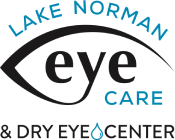Have you ever noticed small specks, cobweb-like shapes, or squiggly lines drifting across your field of vision? These are known as floaters, and while they are common and often harmless, they can sometimes indicate a more serious eye condition. At Lake Norman Eye Care, Dr. Harris and Dr. Williams are here to help you understand what floaters are, why they occur, and when you should seek professional care.
What Are Floaters?
Floaters are tiny, shadowy shapes that appear in your vision, usually when you look at a bright, plain background, like a clear sky or a white wall. They can appear as:
- Small dots
- Lines or squiggly shapes
- Cobweb-like structures
- Thread-like strands
Floaters are created when tiny bits of gel or cells inside your vitreous (the gel-like substance that fills the inside of your eye) clump together. These clumps cast shadows on the retina, the light-sensitive tissue at the back of your eye, causing you to see them as floaters.
Why Do Floaters Occur?
Floaters often occur as a natural part of the aging process. The vitreous inside your eye gradually becomes more liquid over time, causing it to shrink and form clumps or strands. These changes can create the appearance of floaters. In many cases, floaters are simply a sign of aging and are not a cause for concern.
However, floaters can also be linked to other eye health conditions, including:
- Retinal Tear or Detachment: In rare cases, floaters can signal a tear or detachment in the retina, which requires immediate attention.
- Inflammation: Inflammation inside the eye, such as from uveitis, can cause an increase in floaters.
- Diabetic Retinopathy: High blood sugar levels in diabetics can lead to changes in the retina, sometimes causing floaters.
- Eye Trauma: An injury to the eye may lead to the formation of floaters.
When Are Floaters a Concern?
For most people, floaters are harmless and don’t affect vision in a significant way. However, if you suddenly notice a significant increase in the number of floaters, experience flashes of light, or see a shadow or curtain-like effect in your peripheral vision, it’s essential to see an eye doctor as soon as possible. These could be signs of a more serious condition like a retinal tear or detachment, which can lead to permanent vision loss if not treated promptly.
Here are some warning signs that require immediate attention:
- A sudden increase in floaters or the appearance of large, dense floaters
- Flashes of light or a sensation of lightening streaks in your peripheral vision
- A dark shadow or curtain that moves across your field of vision
How Are Floaters Treated?
In most cases, floaters are simply monitored rather than treated. Dr. Harris or Dr. Williams will conduct a thorough eye exam, which may include dilating your pupils to get a better view of your retina and vitreous. If they determine that the floaters are harmless and due to aging, they may suggest you adapt to the floaters and learn to ignore them, as they often become less noticeable over time.
However, if floaters are caused by an underlying eye condition, such as a retinal tear or inflammation, your eye doctor will discuss treatment options. In some cases, treatments like laser therapy or vitrectomy (a surgical procedure to remove the vitreous gel) may be recommended.
How Can You Protect Your Eyes?
Although you can’t always prevent floaters from forming, there are steps you can take to protect your eye health and reduce the risk of serious conditions:
- Schedule regular eye exams: Regular check-ups with Dr. Harris or Dr. Williams will help monitor your eye health and detect any potential issues early.
- Protect your eyes from injury: Wear safety glasses when engaging in activities that could result in eye trauma, such as sports or home improvement projects.
- Manage underlying health conditions: Conditions like diabetes can affect the retina, so managing your health is crucial for preserving your vision.
Schedule an Eye Exam at Lake Norman Eye Care
If you’re experiencing floaters or other visual disturbances, it’s important not to ignore them. While floaters are often harmless, they can sometimes be a sign of a more serious condition that requires immediate attention. Dr. Harris and Dr. Williams at Lake Norman Eye Care are dedicated to providing comprehensive eye care and ensuring the health of your eyes.
Contact us today to schedule an eye exam. Early detection and timely treatment are key to maintaining your vision and eye health. Don’t wait—take the first step toward clearer, healthier vision today!



